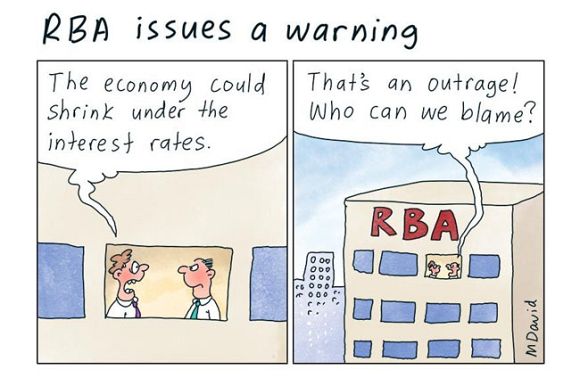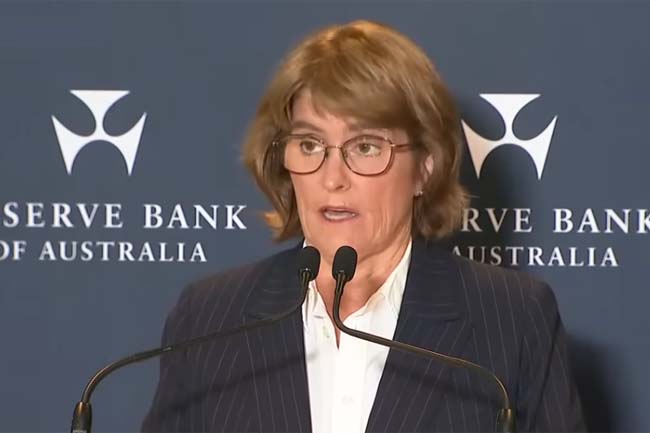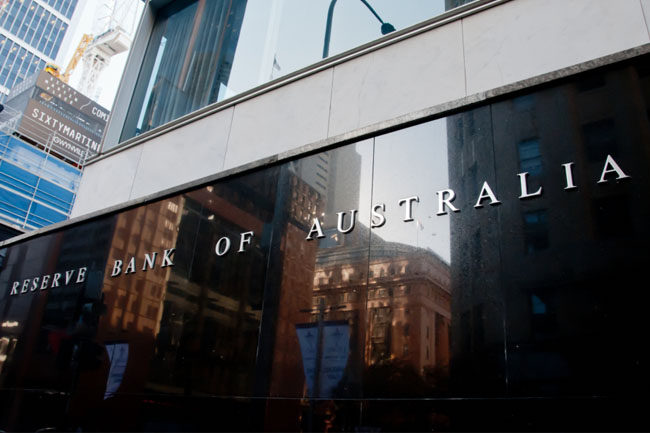The Reserve Bank's next board meeting should bring good news for those fearing further interest rate rises, writes Stephen Koukoulas.
THE NEXT MEETING of the interest rate-setting Reserve Bank of Australia (RBA) Board will conclude on 7 May, when it will announce its decision on the level of the official cash rate.
There is unanimity among economists that interest rates will be left unchanged at a restrictive 4.35%, thereby locking in the 425 basis points of interest rate hikes the RBA imposed between May 2022 and November 2023.
In the past few weeks, the market and most economist’s expectations on the outlook for future interest rate changes in Australia have been transformed. An inflation report that saw inflation come in 0.2 percentage points above market forecasts has seen markets price in a great probability that interest rates will be up, not down, in the months ahead.
While nothing can be ruled out when it comes to the economy and markets, this excessive reaction is downplaying, if not ignoring what is happening to economic growth and the labour market.
The bulk of credible economists have adjusted their forecasts from a series of likely interest rate cuts relatively soon, to just one or two rate cuts by mid to late 2025. In other words, interest rates will be cut, but not yet; when they come, they will be moderate.
Some other economists, always keen for a headline rather than providing decent analysis, have said that interest rates are likely to rise, perhaps towards 5% as they reckon a deep and protracted recession is needed to get inflation lower.
There is a lot of confusion in the broader community surrounding this change in market sentiment and pricing — the data flow in Australia has continued to be weak and the inflation rate continues to track lower.
While the March quarter Consumer Price Index (CPI) was 0.2 percentage points above market forecasts at 1%, this happened after the December quarter result three months ago was 0.2 percentage points below expectations, at 0.6%.
A sober analysis of the drivers of inflation shows that it remains squarely on track to reach the RBA 2-3% target band during 2024 and 2025 without the need for further interest rate rises.
The numbers below show the clear deceleration in inflation since the end of 2022:
- December '22: 7.8%;
- March '23: 7%;
- June '23: 6%;
- September '23: 5.4%;
- December '23: 4.1%; and
- March '24: 3.6%.
The monthly CPI data are even more impressive, with inflation easing from a peak of 8.4% in December 2022 to 3.5% in March 2024.
The other key issue for the RBA is the strength of the economy and what that implies for unemployment.
The pace of economic growth remains weak. Annual GDP is set to track below 1.5% when the March quarter data are released in early June, which, given the strong rate of immigration and population growth, will lock in four straight quarters of falling GDP per capita.
That is disconcerting news that would only get worse with more interest rate rises. Indeed, weak economic growth is effectively baked into the economy — even with interest rates holding at current levels. In the next year, the number of people unemployed is set to rise by another 100,000 without further policy tightening.
What is also clear is that retail spending in dollar terms is flat at best and is falling in real, inflation-adjusted terms.
At the same time, the number of new dwelling building approvals is tracking at its lowest level in more than a decade with high interest rates one of the major constraints on builders ramping up new construction.
The very recent labour force data are “the odd ones out” when it comes to assessments of the economy's growth momentum. “Odd” because in the last few months, employment in trend terms has been firm and the unemployment rate broadly stable at a tick under 4% rather than increasing in reaction to the growth slump over the past 12 to 18 months.
This relatively good recent news on the labour market is set to abruptly end as job vacancies and advertisements are falling. Businesses are scaling back their hiring plans, a factor that, in the past, has been associated with materially higher unemployment.
To round out the disconcerting set of economic news, consumer sentiment is miserable and business conditions are trending lower, suggesting ongoing lethargy in household spending and downside risks to business investment.
Where to for interest rate cuts?
The market about-face on the outlook for interest rates is largely ignoring the news of weak growth.
It also gives scant reference to the revamped goals of the RBA, which were reviewed by Treasurer Jim Chalmers last year, namely:
‘...monetary policy should have dual objectives of price stability and contributing to full employment.’
The elevation of ‘full employment’ to the RBA’s mandate is yet to be tested — it will require a full business cycle to assess the policy response when unemployment is uncomfortably high.
The high probability that the test will be reached during 2024 as the economy remains sluggish and moves away from full employment is relevant to the current debate on monetary policy.
In its aggressive interest rate hiking cycle over the past two years, the RBA wanted to get inflation lower, whilst holding the unemployment rate at 4.5%.
The good news is that these goals are on track with current policy settings where they are.
Next week’s RBA decision will reflect this.
Stephen Koukoulas is an IA columnist and one of Australia’s leading economic visionaries, past Chief Economist of Citibank and Senior Economic Advisor to the Prime Minister.
Related Articles
- When it comes to unemployment, the RBA has got it wrong
- Australia can afford to fix the damage done by interest rate hikes
- RBA's heavy-duty rate rises a lethal tactic in class warfare
- Reserve Bank ignorant to truth behind Australia's inflation
- Reserve Bank has gone mad
 This work is licensed under a Creative Commons Attribution-NonCommercial-NoDerivs 3.0 Australia License
This work is licensed under a Creative Commons Attribution-NonCommercial-NoDerivs 3.0 Australia License
Support independent journalism Subscribe to IA.















